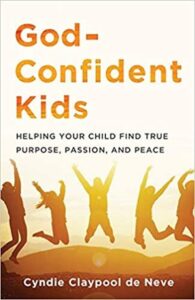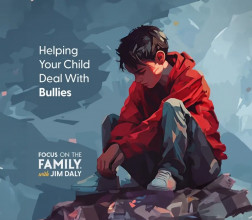Cyndie Claypool de Neve: The main thing I think is to help our kids develop a love relationship with the Lord, to teach them who God is because then they can trust that God’s gonna fulfill that good purpose in their life.
John Fuller: That’s Cyndie Claypool de Neve and, uh, she’s our guest today on Focus on the Family. Thanks for joining us. Your host is Focus president and author Jim Daly, and I’m John Fuller.
Jim Daly: John, every parent wants to raise their children, uh, to be resilient, confident, with a solid identity in Christ. I mean, that is the goal, but sometimes it feels like our kids are under attack, you know? Social media plays a role, and it’s just heavy, all the drama, the competition, and it can just wither a good child’s heart. Uh, here at Focus on the Family, i- it’s our aim to provide you with the tools you need to build up your child in a healthy, positive, and godly way so that they can function as healthy adults. That’s the goal, right? How do we launch these kids into this world to live for Him? And, uh, we recognize parenting can have its challenges, but you know what? Uh, there are tools that we wanna give you, and this is one of them. Uh, Cyndie’s written this great book, God-Confident Kids: Helping Your Child Find True Purpose, Passion, and Peace. Who doesn’t have their hand up for that right now?
Cyndie: (laughs)
Jim: So it is good to have her.
John: Yeah. We’ve got copies of that book at focusonthefamily.com/broadcast. And Cyndie Claypool de Neve is, uh, an associate marriage and family therapist and a very popular speaker, and obviously with that book she’s an author as well, Jim.
Jim: Cyndie, it’s great to have you at Focus on the Family.
Cyndie: Thank you so much. What a treat to be here.
Jim: Yeah, it’s good. It’s fun. Uh, let me ask you as a therapist, you’re working with families, you know, all the time, what are some of the struggles that young people are dealing with today? What are you seeing in your practice?
Cyndie: Yeah. You know, what’s really interesting is the extra anxiety and the stress and the depression, and I talk about that in the book, is just this generation has more anxiety, more depression than any generation before.
Jim: Why do you think that is?
Cyndie: Yeah. You know what? I really think it’s the, the comparison generation-
Jim: Okay.
Cyndie: … that people are growing up in. I mean, there’s a number of reasons, but I keep going back to that comparison generation that we’re in. They’re growing up… The average age I saw that kids get a cellphone is 10 years old-
Jim: Yeah, way too young.
Cyndie: … and so when they… They’re on social media and they can compare themselves to others, and so they’re seeing… It’s not like, oh, well, there used to be this party that you might have heard but you weren’t invited and it wasn’t… it didn’t really attack your soul, but now on social media you’re able to actually see, “Oh, all those people had a party and I wasn’t invited.”
Jim: Uh, your son in first grade, you kinda had a eyeopening-
Cyndie: Yeah.
Jim: … experience there. What happened?
Cyndie: Yeah. So four years old, he became passionate about filmmaking and-
Jim: (laughs)
Cyndie: … never let go.
Jim: Mm-hmm.
Cyndie: And, a- and I should say to any listeners (laughs) that is not normal, so don’t-
Jim: Yeah.
Cyndie: … expect that your kid that at three years old wants to be a vet is gonna continue to always want to be a vet.
Jim: Right.
Cyndie: So don’t hold them to it, but I think God gave him that passion because God knew that school was gonna be incredibly hard for him.
Jim: Mm-hmm.
Cyndie: And five years old, he’s, he’s an amaz-… he’s an extrovert and his first word was hi-
Jim: (laughs)
Cyndie: … and he’d say it to stuffed animals and dogs and people.
Jim: “Forget mom and dad.”
Cyndie: Yeah.
Jim: “I’m going with hi.”
Cyndie: His first word was hi, and so when he went to kindergarten, h- he was all about that. I mean, he was super social and he went to all his friends’ houses and he got the highest academic award in reading, and so he’s going into first grade thinking, “Okay, it’s gonna be just the same.” But it wasn’t, and we didn’t know and the kids weren’t saying mean things to him and the teacher hadn’t even told us, but I’m putting him to bed one night and he says to me, “Mom, why am I so stupid?”
Jim: Mm-hmm.
Cyndie: And that s-word, we didn’t even s-… That was the s-word-
Jim: Right. Exactly.
Cyndie: … in our house. You don’t say it about other people, other things-
Jim: Yeah.
Cyndie: … nothing. We don’t use that word, and there he was saying it about himself, and I… It just wrecked my soul, and I said, “Why wou-… why do you possibly think that?” He said, “Because everyone finishes their schoolwork faster than me.” And it goes back to that comparison. The other kids weren’t teasing him, but he was looking at what they were doing and he felt he wasn’t measuring up, and that’s where that definition of self-confidence I think comes from is it’s not about what we thi-… just how we think we are. It’s what we think other people think we are.
Jim: Right.
Cyndie: And for him, he had deduced that he was stupid, and that took us on a long journey with, u- uh, IEPs, the Individualized Education Plan, and, um, my husband had dyslexia and so he had already spotted in kindergarten ’cause Elliott had a hard time differentiating between 12 and 21-
Jim: Right. Mm-hmm.
Cyndie: … and D, B, P, and 9.
Jim: Right.
Cyndie: If you think about it, they’re all the same.
Jim: All the classics.
Cyndie: Yeah, and it just all spins around in his mind, and so-
Jim: Yeah.
Cyndie: … um, we… It was really hard for him, but because he was passionate about film we were able to use that like, “Okay, nobody’s gonna give you a big budget if you can’t count to 100-”
Jim: (laughing)
Cyndie: “… if you can’t do multiplication.” Um, you know, so it was that piece that we found was really that thread that helped him get through school is that ultimate goal of he wanted to be a filmmaker and to be able to encourage him because it was really difficult for him.
Jim: Yeah. Uh, you had some difficulty too and you write about that in the book. What, what happened-
Cyndie: Yeah.
Jim: … in your childhood, and what gave you probably sympathy and maybe even-
Cyndie: Mm-hmm.
Jim: … guided you toward becoming a counselor?
Cyndie: Yeah, so it was, um, you know, when those things happen as parents and we all of a sudden go back to when we were kids, and that’s what happened to me. I’m like, “Oh my goodness. He’s gonna have this…” ‘Cause I had, uh, no self-confidence and because I was dealing with health issues when I was little and I developed really bad asthma about third, fourth grade and they put me on this medicine that made me really tired on top of it, and so I didn’t want people to know I was wheezing and so I would take these really shallow breaths, but of course what happens when you take really shallow breaths? (laughs)
Jim: You pass out. (laughs)
Cyndie: But I didn’t know that, so fourth grade, the first time I passed out I was so mortified. I was… It was a combination class, and so there was probably, like, 40 kids. I’m in the middle of the classrooms, everybody’s looking at me, and bam, down I go.
Jim: Wow.
Cyndie: And then the first day back after they ran all these tests, they thought I had leukemia, all the stuff, and then the first day back to school I passed out again, and then I decided, “You know what, God? You did not know what you were doing when you put me together.” And I deci-… I, I asked Jesus in my heart when I was four and… but by eighth grade, I totally regretted that decision. I knew the verse that said that God would never let Satan pluck me out of His hand, and I was mad about that-
Jim: Yeah.
Cyndie: … ’cause I’m like, “Wait, how do I become an un-Christian? I don’t like God.” It wasn’t that I ever had a question, “Is there a God or isn’t there a God?”
Jim: Right. “I just don’t like His game plan.”
Cyndie: I knew there was a God. Yes.
Jim: (laughs)
Cyndie: And I’m like, “If there was a God, shouldn’t He have put me together a little bit better?” (laughs)
Jim: Okay, but… Now, I mean, this program’s about parenting, but you’ve taken us-
Cyndie: Yeah (laughs).
Jim: But no, I appreciate that, but y- i- y- you know, someone… many people are probably saying, “Well, what… How’d you get back on track?”
Cyndie: Yeah. Yeah.
Jim: I mean, how many years did it take and what did it take?
Cyndie: Yeah. Yeah, you know what? God sometimes takes years and sometimes… For me in eighth grade, um, I had gotten to… Um, you know, there- there’s the… An- and, and Sally Burke, um, the president of Moms in Prayer, uh, we write books on, um, prayer and, and we talk about the importance of being thankful and how that can… You know, the more you’re thankful and how that actually there’s science behind how that boosts your brain-
Jim: Yeah.
Cyndie: … and your positivity and, um… But the opposite is true, and so that’s what I was doing in eighth grade. I was like, “I don’t like my nose. I don’t like my lungs.”
Jim: (laughs)
Cyndie: I always had tissues ’cause I had these horrible allergies (laughs)-
Jim: Right.
Cyndie: … and so I had… I even wrote a poem about all the horrible things that God had done when He put me together.
Jim: Wow.
Cyndie: And… Yeah (laughs). And so, um, so I was dedicated to this.
Jim: You were.
Cyndie: (laughs) but being the fourth of six kids, I didn’t tell anyone-
Jim: Uh-huh.
Cyndie: … and nobody knew that I was feeling so depressed, and I was just done. I was tired, and I, I actually sat on the floor in my living room with encyclopedias. Thank the Lord that there wasn’t an internet at the time because I wanted to figure out, “How do I end my life?” I didn’t even know if… I’m not even sure if I knew the word suicide. I just wanted to be done. “How do I finish this and get over this? I’m tired, I don’t like God, I don’t like my life. I’m just done.” But as God happened to do while I was wrestling through all of that, uh, my parents had become really involved in Sunday school and church, and so not going to church was not an option and I wasn’t gonna make waves because, you know, didn’t want people looking at me, and so I had a Sun-… In the Sunday school class, one of the Sunday school teachers was gonna give us points for reading the Bible, and so I thought, “Well, I do love points, but I want nothing to do with God.” And, and that’s what I told Him. So every time, you know, you’re supposed to pray before you read the Bible, that’s what I was told and-
Jim: Get a point for that (laughs).
Cyndie: … so (laughs), so I would… Uh, my prayer was, “God, I do not like you. I’m reading my Bible for points and not for you.” And then I would read the Bible, but God’s Word does not return void.
Jim: This is amazing (laughs).
Cyndie: And I was raised with psalms and I love to read, and so it was a problem and I’m like, “This David guy is kinda whack, you know? (laughs) he’s, like, excited and then he’s depressed and, you know, he’s all over the place.” But then I got to Psalm 139 and that I was fearfully and wonderfully made, and it just struck me. I mean, God just put me where I could actually hear that and that I was fearfully and wonderfully made, that He had, He had weaved me in my mother’s womb.
Jim: Yeah.
Cyndie: And I’m like, “Oh, wait. Maybe He does have a purpose. Maybe I wasn’t just the, the forgotten runt of the family. Maybe there was a purpose and intentionality in all of this.”
Jim: Mm-hmm.
Cyndie: And that… the phe- Ephesians 2:10 verse, you know, that we, that we are God’s masterpiece, we’re handcrafted by God Himself for a good purpose that He prepared in advance for us to do, and so at that time I decided, “You know what? I wanna know what my good purpose is. Why did God create me with all this crazy?”
Jim: This is all in the eighth grade?
Cyndie: This is eighth grade.
Jim: (laughs)
Cyndie: I know. I was one of those-
Jim: Okay. You were active eighth grader.
Cyndie: (laughs)
Jim: I was like, “How do I play football?”
Cyndie: I’m very-
John: (laughs)
Jim: “I wanna play football, football, football.”
Cyndie: (laughs)
Jim: You’re thinking of these big things in life. Let me, let me ask you, though, I mean-
Cyndie: Mm-hmm.
Jim: … all of that, it does set up a heart-
Cyndie: Mm-hmm.
Jim: … for children, which is what-
Cyndie: Yeah.
Jim: … you’re all about today, and families-
Cyndie: Mm-hmm.
Jim: … and helping them. And I think the big question then is given your experience personally and then what you’ve seen-
Cyndie: Mm-hmm.
Jim: … even in your own children and those that you help counsel, you know, what’s the answer to this, this hunger for knowing who I am-
Cyndie: Mm-hmm.
Jim: … and what I’m about?
Cyndie: And really it goes… To me, what I see in the Bible and what I’ve experienced with God is it’s not about the rules and regulations. I’ve seen so many parents that are like, “No, your hair has to be cut short-”
Jim: (laughs). Right.
Cyndie: “… or you have to be, you know… You’re five minutes after…” I’m not saying that, you know, there’s the, the curfews and all of that, but there’s… we’re, you know, very much about the rules and regulations of, “This is how I want my kid to rai-… be raised.” But there’s the heart that needs to be addressed.
Jim: That needs to be the focus.
Cyndie: Yeah. And that passion for God, not just going to church but developing for passion for God, a love relationship with God, and that’s what I talk about in the book, um, throughout is how the Bible talks about that it’s this love relationship with the Lord and how can we help our kids learn that? That’s what’s gonna carry them through all those, you know, my son sitting there not being able to read the test questions, but God’s with him-
Jim: Yeah.
Cyndie: … and if he fully understands that, he can pray and ask God to help him and whether he fails the test or not, it’s that peace that God can bring, knowing that Romans 8:28, that God’s gonna work all things together.
Jim: You know, something you mentioned that I did wanna tap and you’re touching on it now is that idea to l- let your kid struggle.
Cyndie: Mm-hmm.
Jim: You know, so many parents today, we wanna save them, we wanna bail them out. Um, I think early on Jean and I certainly did that. (laughs) one guy when the kids were young, he was asking them questions and I, I kept answering the questions, you know?
Cyndie: Oh, yeah.
Jim: Not necessarily over them, but they would give their answer and then I’d fill in all the blanks that-
Cyndie: Mm-hmm.
Jim: … they missed, you know? And he just looked at me and he said, “You know, your kids are old enough to speak for themselves.”
Cyndie: (laughs)
Jim: Ooh. It was awesome-
Cyndie: Yeah.
Jim: … and I was like, “You’re right.”
Cyndie: Mm-hmm.
Jim: He goes, “Hey, you gotta kinda let them… Let them speak.”
Cyndie: Yeah.
Jim: You know? They were probably five and seven, something like that, but I was like, “Yes, yes, but when he did the rocket ship plan, of course he put it on a pod and he did…”
Cyndie: (laughs)
Jim: You know, I was filling in all the things-
Cyndie: Yeah.
Jim: … they left out. But that’s what you’re talking about to an extent-
Cyndie: Mm-hmm.
Jim: … is let them struggle through their situation. Don’t always bail them out, right?
Cyndie: Yeah. So, like, my daughter’s an introvert. She would love me just to answer all the questions for her, but-
Jim: It’s a safe place.
Cyndie: Yes. And so for me, for her to say, “Oh, can you go up there and ask for…” I’m like, “How about you…” You know, we practice, “What do you say? How are you gonna say that? Okay, go do that.” Um, even now at college, you know, if there’s a difficult email, she’ll call but I’m like, “I’m not gonna write the email for you.” You know, she… To teach them how to do that themselves-
Jim: Right.
Cyndie: … and to develop that resiliency.
Jim: Let me, let me explore a little bit about developing-
Cyndie: Mm-hmm.
Jim: … God confidence in our children. Um, one of the first steps you say is to uncover our child’s uniquenesses.
Cyndie: Mm-hmm.
Jim: You’re kind of saying that-
Cyndie: Mm-hmm.
Jim: … with your daughter-
Cyndie: Yeah.
Jim: … but how does a parent go about identifying those uniquenesses that they then can use as tools to talk to their kids-
Cyndie: Yeah.
Jim: … about how God made them?
Cyndie: Yeah. So I spend a chapter in the book just talking about really practical things and helping your kids figure out what they like other than just, you know, playing Minecraft or (laughs)…
Jim: Are you, are you babysitting our kids? Th- that’s funny. Minecraft. That’s what it was all about.
Cyndie: Yeah.
Jim: That’s funny.
Cyndie: Um, but to be able to help them find what they like that’s outside that. Maybe it’s playing soccer, maybe it’s… Uh, my mom used to do, um, like… teach the kids how to knit or to sew and to find people that are really good at that. Like, my, my husband is, um… you know, was really into videotaping, and so to be able to, uh, help… He helped Elliott make his first dinosaur movie and to be able to-
Jim: (laughs). Save that.
Cyndie: Yeah. (laughs) yeah.
Jim: (laughs) that’ll be… That could be really important someday.
Cyndie: Yeah. Yeah, but to be able to come alongside their passions. I think parents a lot of times wanna put kids in a box. We want to create the best version of ourselves in our kids, a- (laughs)…
Jim: Boy, that’s powerful.
Cyndie: … and to be able to figure out what God wants them to do instead of what we want them do.
John: Mm-hmm. Well, we’re talking today on Focus on the Family with Cyndie Claypool de Neve and, uh, her book is called God-Confident Kids: Helping Your Child Find True Purpose, Passion, and Peace, and it’s really good stuff here. We do encourage you to get a copy of that from us, and our number is 800, the letter A, and the word FAMILY or online. You can find it at focusonthefamily.com/broadcast.
Jim: Cyndie, let me ask you about emotions.
Cyndie: Mm-hmm.
Jim: Um, I’ll speak to the parents right now that have teenagers (laughs) in the home.
Cyndie: Yeah.
Jim: I mean, what our experience was is… You know, and we don’t have girls so we had the boys, and we recognized, I mean, these emotional outbursts that you couldn’t-
Cyndie: Mm-hmm.
Jim: … understand, “Okay, why is he so upset about his homework or whatever?”
Cyndie: Mm-hmm.
Jim: And, uh, but really at about 18 I noticed y-… Trent particular, our oldest, just begin to make this turn, you know? He started to have adult conversation with us-
Cyndie: Mm-hmm.
Jim: … he started to ask questions, and we’re… I mean, I remember Jean and I (laughs) lying in bed one night going, “Did you hear him say that? That was amazing. It’s like he’s a little adult now.”
Cyndie: Yeah.
Jim: I… You know, you start… And so I guess the, the question I’m asking is really, uh, being the parents and knowing that the teen years bring such emotional rollercoaster-
Cyndie: Mm-hmm.
Jim: … attitudes that you can’t explain, they can’t even explain-
Cyndie: Mm-hmm.
Jim: … why they’re behaving that way, how do we manage that productively toward bending a child in a confident-
Cyndie: Mm-hmm.
Jim: … God-like way?
Cyndie: Yeah.
Jim: Wh- what did you find and what have you found to be most successful-
Cyndie: Yeah.
Jim: … that both as a parent and as a child?
Cyndie: Mm-hmm. Um, i- if your kids aren’t teenagers yet, it’s helpful to start giving them the language of emotion early on-
Jim: Oh, that’s good.
Cyndie: … just like, “Oh, it seems like you’re feeling frustrated. Oh, you seem angry. Are you feeling sad?” And to be able to give them those words because a lot of times, they may just act out, they might just punch the table (laughs) or something, and to be able to say, “Oh, looks like you’re expressing anger. Are you angry about something?” And to be able to give them those words, a… Kids are not intuitively… They don’t intuitively know what those emotions are, and so for us as adults to be able to come alongside them and say, “This is what it seems like you’re feeling. Is that accurate?” And then they can start talking about that, and, and I think that’s really the key. It helps to start younger, but when they… You can start at any point in time and even with teenagers because there is that frustration and that anger, “S- seems like you’re frustrated about something today.” Now, sometimes they’re gonna come back and they’re just gonna snap because they’re that frustrated, and what I like to do is enco- encourage parents, “You’re their safe place. They’ve been bottling all that up all day, trying not to yell at the teacher and their friends and their girlfriend and their whatever. They’ve been bottling that all up, so when they come home they just squirt it out all over the place.”
Jim: But it’s true, yeah. You gotta contain that. Let’s move to the, the fear-based parenting-
Cyndie: Mm-hmm.
Jim: … versus the faith-based-
Cyndie: Yes.
Jim: … parenting because I think this is really critical and, you know, you can vacillate between these two types, but-
Cyndie: Mm-hmm.
Jim: … you really want to land on the faith-based parenting. But to even describe it, some parents that are fearful parents-
Cyndie: Mm-hmm.
Jim: … don’t even realize that-
Cyndie: Yeah.
Jim: … that what they’re communicating… So speak to those two-
Cyndie: Yeah.
Jim: … ends of the continuum.
Cyndie: Um, where the fear-based parenting comes in is that they’re… they don’t want their kids to suffer. That’s one of it is, “Oh, oh, what if they get into soccer and they, they get hurt or-”
Jim: Kinda the helicopter parent, I guess.
Cyndie: Yes. Yes. Or, “Oh, they can’t stand up for themself,” so instead of giving them the words to talk to the teacher or the kids at school or whatever, they’ll go and talk to them for them and that’s because they have that fear. And, a- and part of fear is also the controlling, you know? It’s like, “I need to be… I’m the adult. I need to be able to, to take care of the situation,” instead of trusting that God can empower their kids to take care of the situation and they’re gonna learn from that, and instead of… You know, there’s the, “Do they go to the party or not?” Fear-based parents tend to say no more than yes because they’re… they want… they don’t wanna get out of the comfort zone, they don’t want to, uh, have to investigate if that’s a good party for the kids to go to, but what happens when we’re fear-based is that we are tr-… we’re not allowing our kids to, one, experience life, two, be able to trust the Holy Spirit in their life, to be able… We’re not teaching them to hear from the Holy Spirit.
And, um, where faith-based parenting, it allows us to be able to pray about the things and to say, “You know, maybe it’s okay. Maybe…” Like I share in the book, you know, my daughter was at a charter school for her first three years, yeah, kindergarten, first, and second, and it was very heavily Christian-based, but God was calling us to send her to our local public school. And it took me a year, and I… it was fear that kept her at the charter school in second grade, and, and it was for academic reasons but also because, you know, when our kids are out in public school, we are then meeting families who need to hear about Christ.
Jim: No, that’s so true.
Cyndie: And she was able to invite a lot of kids to school… to church-
Jim: Yeah.
Cyndie: … and my son, he did… he vacillated. Um, he did the charter school for a few years but, you know, early years and his high school years, it was a public school and that’s where they’re able to be out there in the world and inviting people living out Christ and they have to deal with the difficulties of that. I’m not just promoting public school (laughs), but-
Jim: Yeah, no, i- it’s, it’s very tailored to each family.
Cyndie: Yeah. Yes.
Jim: But I like those points. I think those-
Cyndie: Yeah.
Jim: … are very helpful. You know, as adults we sometimes struggle with recognizing what is our deep purpose.
Cyndie: Mm-hmm.
Jim: I mean, I think most adults may struggle to answer that question. Um, you have a story about your nephew, Harley. Uh, what did you learn from Harley?
Cyndie: Yeah. Harley is an amazing kid. His mom, my sister, is a single mom, and he bright-eyed, bushy-tailed when he was born, but four year olds, he started having seizures.
Jim: Mm-hmm.
Cyndie: And he went through all these different tests and there’s… it’s… He, he has all different types of seizures called Lennox-Gastaut syndrome, and his brain got stuck in seizure mode so much that they had to do a medically-induced coma and he couldn’t wake up.
Jim: Mm-hmm.
Cyndie: And we had people praying and praying, and-
Jim: How old was he when this-
Cyndie: He was four, I think.
Jim: Four. Mm-hmm.
Cyndie: Yeah. And he had all… I mean, it was horrifying to see him, and he had this tiny little body and all these tubes, you know, running off of him, and he’s, he’s so… was so vivacious, and there he was just still, and my sister was in the room and they were gonna pull the plug and she thought that’s it, and they said, “Okay, once we pull the plug, then you can take his little body and go to the beach or do, you know, whatever.” And that’s what she was expecting, but they pulled the plug and he opened his eyes.
Jim: Mm-hmm.
Cyndie: And she said, “Are you looking at me?” And his eyes just followed the nurse and he slowly started coming back, but his brain wasn’t fully functioning-
Jim: Yeah.
Cyndie: … and so he’s I think about 25 right now and he’s still at probably first-grade level-
Jim: Yeah.
Cyndie: … but his smile even though… Because he still has all these seizures so he has no front teeth, but his smile lights up a room-
Jim: Yeah.
Cyndie: … and he will sing the Christmas songs and h- he usually sings, like, every other word and you just… It’s just that joy that you get, but the people that they have met when he’s had many hospital stays, the people that they have met in those hospital stays have needed to hear about the love of Christ, and wh-… that was not their original plan was to spend all that time in the hospital and to get to know all these nurses and doctors, but they are living out Christ in front of these people and I talk about in the book about Harley is because he is a great photographer, and to be able to find something that even in his limited physical abilities that he could be able to express himself-
Jim: Yeah.
Cyndie: … through that…
Jim: That’s beautiful.
Cyndie: Yeah.
Jim: Yeah. And in, in that way, I mean, right at the end here, that special purpose or that, uh, daily purpose, you, you encourage parents to ask their kids about their daily purpose. What…
Cyndie: Mm-hmm.
Jim: I mean, we’re the Daly family. We think of-
Cyndie: That’s right.
Jim: … Daly purpose, but-
John: Yeah. You do that all the time, right?
Cyndie: (laughs)
Jim: … I don’t think you mean it that way.
Cyndie: Yeah.
Jim: What, what should we be asking our kids every day?
Cyndie: Yeah. So I started that when I was teaching Sunday school as to be able to hear from the kids, you know, “What, what did God have you do this week that you feel like God purposed you to do?” And there was things like, “Oh, hug my dad so he would feel better or, uh, make somebody laugh or, you know, in s-… at school to be able to sit next to somebody that didn’t have a friend.”
Jim: Uh-huh.
Cyndie: And just what that means for them, and so then each day we can ask families. I mean, I will go on record to say that I don’t always remember to do that, but (laughs), but we can each day ask our kids-
Jim: It’s a good thought.
Cyndie: … to, you know, “What did God put in path that you know was your good purpose for that day?” And sometimes we miss it. I mean, I know for me I can hear God say, “Oh, you need to go talk to that person standing in the grocery line.” I’m like, “I just don’t want to. I’m wearing a mask. I’m… You know, or whatever (laughs).”
Jim: (laughs)
Cyndie: Um, and… but when I do and I step out of my comfort zone and I’ve listened to that still small voice of the Holy Spirit saying, “Hey, you need to go do that.” Then that’s, God’s good purpose that I’m listening to, and there’s always… God never disappoints when we follow His path.
Jim: Yeah. Right here at the end, what… You know, you’ve written the book God-Confident Kids: Helping Your Child Find True Purpose, Passion, and Peace. Um, what’s that one thing we need to make sure we get done?
Cyndie: Mm-hmm.
Jim: I mean, that may be a tough question, but…
Cyndie: Yeah. The main thing I think is to help our kids develop a love relationship with the Lord. I think too many times, we get stuck on the rules and the Bible stories, which are fascinating, all those Old Testament stories, David and Daniel and all those, but to help them develop that love relationship with the Lord, to teach them who God is. I liken it to, you know, having, having, um, coffee with your best friend, you know, to, to start with praise, to, to go through the attributes of God, you know, “God’s loving and kind and generous-”
Jim: Mm-hmm.
Cyndie: “… and He’s our provider, our protector.” And to help them know who God is because then they can trust that God’s gonna fulfill that good purpose in their life.
Jim: Yeah, Cyndie, this is really good and I- I’m all in on this ’cause I think you’re, you’re hitting the right tone-
Cyndie: Mm-hmm.
Jim: … when it comes to parenting, and so often i-… we just fall to the rules and regulations-
Cyndie: Mm-hmm.
Jim: … ’cause they’re, they’re measurable, they’re manageable, but I can remember, uh, doing a broadcast with a girl and when she was 17 she was pregnant and, you know, the way that rippled through this Christian family, and she said, “I knew the stickers, how to win the stickers. I didn’t know about God’s grace.”
Cyndie: Mm-hmm. Yeah.
Jim: And I’m reminded of that right now, just that’s what you’re saying. How do we-
Cyndie: Yeah.
Jim: How do we turn our children’s heart on to God’s love for them, His grace-
Cyndie: Yeah.
Jim: … for them along with those predictable behaviors that’ll make you successful?
Cyndie: Mm-hmm.
Jim: But it’s not about those. It’s about knowing God and loving God.
Cyndie: Yeah.
Jim: And you’ve expressed that so well today. Uh, let me turn to the listeners. Uh, Focus is here for you. Hope you know that. I think you know that, and, you know, the support community, uh, they have provided the means for us to supply counselors and resources and all the things if you’re struggling, and certainly, uh, Cyndie’s great book is here for you as well. I- if you can make a gift of any amount, we’ll send it as our way of saying thank you. Maybe you’re that parent that is doing it by the rules, you’re going to bed frustrated every night, uh, because that child of yours just isn’t living up to your expectation. It might be that moment where you need to really look at what you’re doing as a parent, and Cyndie’s book is a great starting place along with what our counselors can help you with. But get in touch with us. It starts there. And, uh, if you can’t afford it, don’t worry about it. We trust others will be able to cover the cost of that. Just get touch in with us. What’s most important to us is that you have the help you need.
John: And our number’s 800, the letter A, and the word FAMILY or stop by focusonthefamily.com/broadcast. On behalf of Jim Daly and the entire team here, thanks for joining us for Focus on the Family. I’m John Fuller inviting you back as we once again help you and your family thrive in Christ.






















